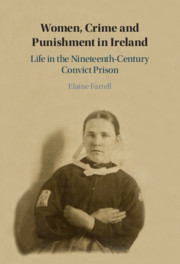‘The first comprehensive analysis of incarcerated women in Irish history, this book is nothing short of path breaking. Persuasive, innovative, and convincing, Farrell's book integrates the history of institutions in Ireland - a current fascination of many - with astute analyses of gender and sexuality, 'deviance' and criminality, and bodies and emotions. In the hands of this skilful historian, the daily struggles and triumphs of ordinary if 'outcast' women in the past come alive, providing essential context for discussions of gender in Irish life today.’
Cara Delay - College of Charleston
‘This work is a microcosm of nineteenth century Irish society dealing with gender, class, religion, poverty, and emigration. By reconstructing the experience of the female prisoner, her family and friends and the female staff within the prison system, it offers a new understanding of crime and punishment at the time.’
Bernadette Whelan - University of Limerick
‘The merit of this work, when reviewed within our long tradition of top-down historical writing, is the fact that the extraordinary exists merely in the ordinary.’
Judy Bolger
Source: Book Reviews (www.womenshistoryassociation.com)
‘Women, Crime and Punishment in Ireland offers readers a deep and reflective insight into the world of women who were convicted of crimes and sentenced to three years or more in Mountjoy Female Convict Prison in Dublin.’
Jennifer Redmond
Source: History: The Journal of the Historical Association
‘Farrell … provides readers with expert research and copious examples to demonstrate the interconnectedness between those imprisoned and the staff who oversaw them.’
J. M. O'Leary
Source: Choice
‘Elaine Farrell’s meticulously researched monograph … the first comprehensive study of imprisoned women in Ireland, reconstructs the day-to-day experiences of convict women … to illustrate the lived reality of incarceration … This book is … not only a useful corrective to the oversized influence of the cult figure of the male Irish political prisoner, but also a welcome addition to nineteenth-century Irish social history.’
William Meier
Source: Victorian Studies



